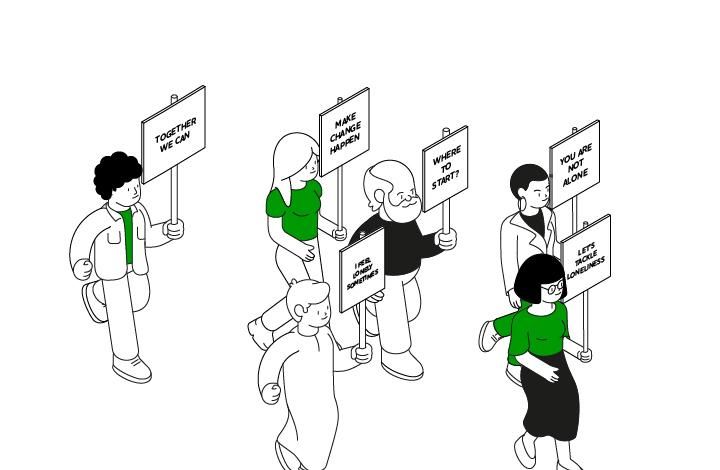
Loneliness for people in later life can be a real challenge on a daily basis. Many older people may become lonely due to the loss of a loved one or spouse, relocation to new settings or it may be due to having developed an illness or a disability.
Whatever the circumstances loneliness can be detrimental to a person’s mental and physical health, it is estimated that loneliness could increase the risk of death by 26%.(Holt-Lunstad et,al 2015)
Our survey found that 62% of people who reported being lonely ‘often or always’ said that feelings of loneliness had a negative effect on their mental health.
For Mental Health Awareness Week 2022, the Empowerment and Later Life Team co-facilitated a number of focus groups with external partners. The Mental Health Foundation wanted to give older people a space to express themselves and their experiences around loneliness. Through these focus groups, we discussed the challenges of connecting digitally and their feelings around loneliness.
Although not everyone identified as lonely, they did talk about the different ways they used to manage their daily life, make their well-being better and reduce their feelings of loneliness. From these conversations, we were able to compile a list of tips to help manage and reduce loneliness and promote better mental health.
We would like to thank, Dementia Adventure, Sparko TV and Picture This in association with Notting Hill Genesis for helping organise these focus group events.
It’s hard with no family here. Difficult for me to get out. I’ve got a little garden, and talk to my flowers. I talk to my plants. Everything that comes out of my mouth I say to them I know they won’t talk back
We can be lonely even when we’re surrounded by people. We can be our own worst enemy because we’re afraid to share our feelings
We can be lonely even when we’re surrounded by people – I have a big family, but inside I was the loneliest person who didn’t belong. I felt nobody cared or knew I existed. I was so lonely, I had no confidence or self-worth. This has changed my life, I feel included and needed
Acknowledgements
Dementia Adventure – Helping people living with dementia to retain a sense of adventure by getting outdoors and connecting with nature, themselves and their community.
Sparko TV – SPARKO Virtual Retirement Community (VRC) is a UK-based service-tech start-up and is endorsed by Age UK, leading housing associations, and a number of other charity organisations.
Notting Hill Genesis – Notting Hill Genesis is one of the largest housing associations in London and the South East.
Picture This – Picture This is a new digital creative program designed to help people in later life who are experiencing digital exclusion.
The Blue Prescribing Project and Wildfowl and Wetlands Trust – The Blue Prescribing Project is a wetland health programme specifically designed, in consultation with participants, to promote a range of mental and physical health benefits through facilitated wetland nature engagement.
Resources
Samaritans – a UK-based charity that provides support at any time, from any phone for free. Call free on 116 123
Hub of Hope – a national mental health database, bringing help and support together in one place.
The Joy Club – The Joy Club is an online activities club that provides inspiration for a joyful retirement.
References
Article Information
Volume: 10 issue: 2, page(s): 227-237. Article first published online: March 11, 2015; Issue published: March 1, 2015.
Julianne Holt-Lunstad1, Timothy B. Smith2, Mark Baker1, Tyler Harris1, David Stephenson1
1 Department of Psychology
2 Department of Counseling Psychology, Brigham Young University
Corresponding Author
Julianne Holt-Lunstad, Department of Psychology, Brigham Young University, 1024 Spencer W. Kimball Tower, Provo, UT 84602-5543 or julian%6ee_h%6fl%74-luns%74ad@byu.ed %75" rel="nofollow"> julianne_holt-lunstad@byu.edu .
Learn more about Mental Health Awareness Week
Mental Health Awareness Week is an annual event that was created by the Mental Health Foundation and is hosted every May.
Find out more